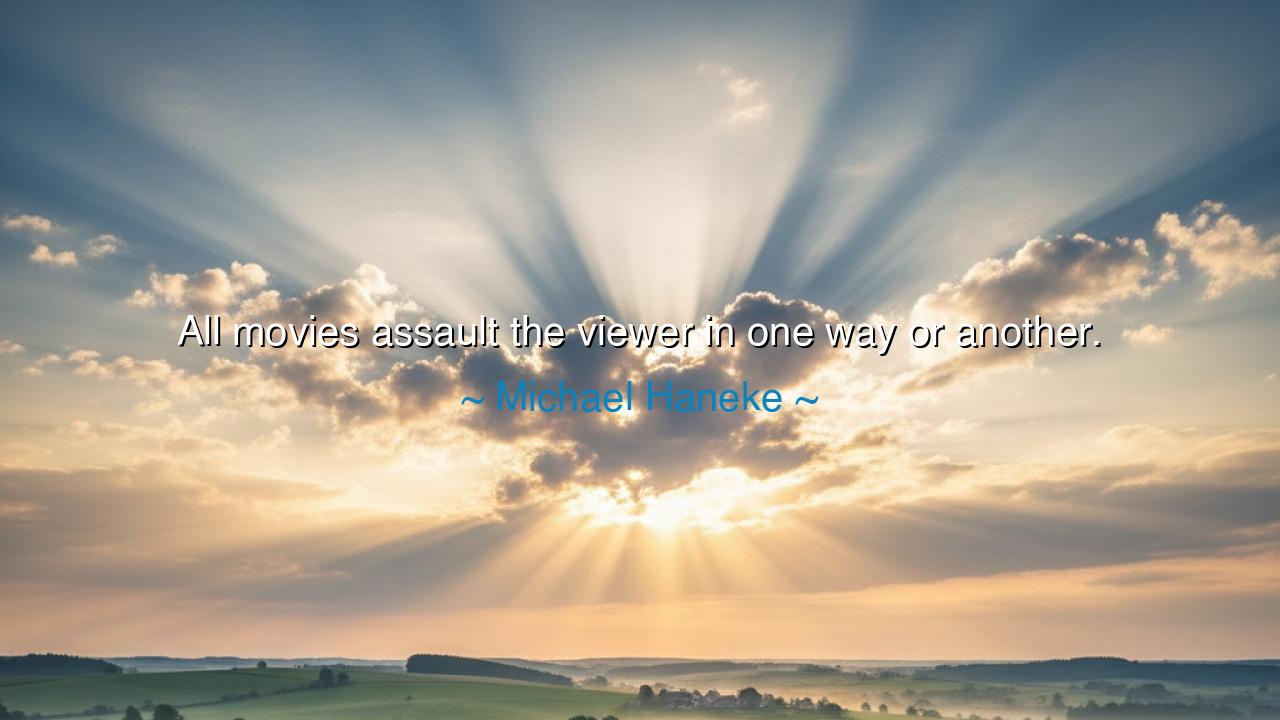
All movies assault the viewer in one way or another.






Hear, O seekers of wisdom, the austere words of Michael Haneke, the master of unease: “All movies assault the viewer in one way or another.” At first, this seems harsh, as though cinema itself were an act of violence. Yet what Haneke speaks is not cruelty, but truth—for every act of storytelling presses itself upon the heart, stirs the senses, and alters the soul. To witness a film is not to remain untouched; it is to be struck, whether by wonder, by fear, by laughter, or by sorrow.
For what is an assault but an intrusion upon one’s peace? When the screen glows and the story begins, the viewer is no longer master of their thoughts; they are carried into another’s vision. Even the gentlest romance assaults us with longing, even the lightest comedy forces the body to convulse with laughter, even the heroic tale shakes us with desire for courage. Haneke, who often lays bare the darker truths of existence, reminds us that cinema, by its very nature, unsettles the still waters of the soul.
History itself shows the power of this assault. When D. W. Griffith unveiled The Birth of a Nation, the audience was shaken—some with awe at its spectacle, others with horror at its racism. Decades later, when Eisenstein’s Battleship Potemkin was shown, the Odessa Steps sequence struck viewers like a storm, inspiring revolutionaries and frightening rulers. These films, though different in purpose, reveal the same truth: cinema does not politely ask permission to enter—it seizes the senses and leaves its mark.
Haneke himself is heir to this tradition. His works, from Funny Games to Cache, do not soothe but wound, forcing the viewer to confront the violence, guilt, and silence woven into modern life. He offers no comfort, no easy answers; instead, his films are deliberate assaults upon complacency. In this, he follows the path of the ancient dramatists. For did not Sophocles with Oedipus Rex strike Athenians with horror at fate? Did not Euripides with Medea shatter their notions of justice and love? The assault of art is as old as art itself.
The deeper meaning of Haneke’s words is that no one leaves a story unchanged. To sit before a film is to surrender the self for a time, to allow images and sounds to carve themselves into memory. The assault may be gentle—a lullaby of nostalgia—or brutal, a mirror of cruelty. But either way, the viewer is moved. To deny this is to deny the power of cinema, and to forget that every act of art wields force, whether subtle or overt.
The lesson, O listener, is twofold. As a creator, understand that to make art is to strike at the soul of another. Therefore, strike with purpose—do not waste the assault on vanity, but use it to awaken, to challenge, to inspire. As a viewer, be mindful that what you watch will shape you. Choose not only what entertains, but what strengthens your spirit and expands your sight, for every story leaves its scar or its blessing.
So let Haneke’s words stand as both warning and call: all movies assault the viewer—but in this very assault lies their greatness. To endure it, to reflect upon it, to let it change you, is to partake in the eternal cycle of art and humanity. For the artist wields the blade of vision, and the audience bears its cut. Yet in that wound, there is also growth, and through this exchange, the soul is carried beyond itself into the immortal realm of meaning.






AAdministratorAdministrator
Welcome, honored guests. Please leave a comment, we will respond soon